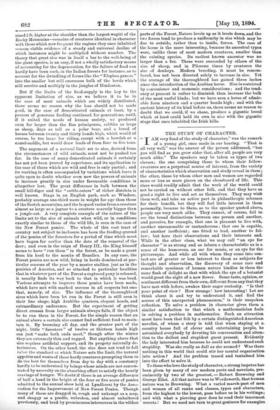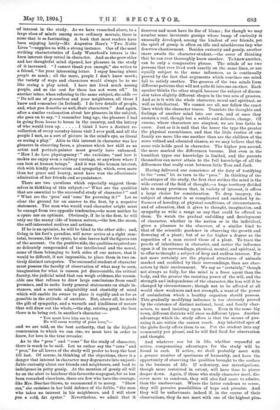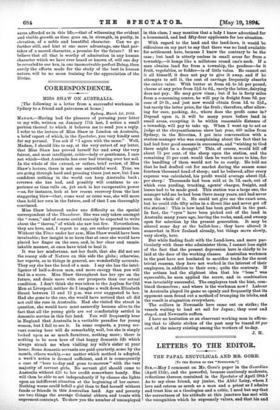THE STUDY OF CHARACTER.
" AM very fond of the study of character," was the remark- of a young girl, once made in our hearing. "That is all very well," was the answer of the person addressed, "but you will find as you grow older that, after all, people are very much alike." The speakers may be taken as types of two- classes; the one comprising those to whom their fellow- creatures are a perpetual source of interest, from the variety of characteristics which observation and study reveal in them; the other, those by whom other men and women are regarded more or less as mere pieces on the chessboard of life. This- class would readily admit that the work of the world could- not be carried on without other folk, and that they have as good a right to live and act as themselves. They may wit* them well, and take an active part in philanthropic schemes for their benefit, but they will feel little interest in them personally, because to them, as to the speaker quoted above, people are very much alike. They cannot, of course, fail to- see the broad distinctions between one person and another„. and perceive, for example, that one is pleasant to live with, another unreasonable or cantankerous ; that one is capable, and another inefficient; one fitted to lead, another to fol- low; but here their observations and their interests end.
While in the other class, what we may call "am eye for character" is as strong and as inborn a characteristic as is a sense of the humorous, an ear for music, or an eye for the- picturesque. And while all with whom they come into con- tact are of greater or less interest to them as subjects for thought and observation, the discovery of some rare and remarkable specimen of human nature kindles in them the- same flash of delight as that with which the eye of a botanist would greet the sight of a new flower. Some taste, opinion, or
sentiment different from their own, different from any that they have met with before, awakes their eager curiosity. "Is that-
your point of view ? How strange ! how interesting! Let me- think about it and try to understand it, and find the source of this unexpected phenomenon," is their unspoken
reflection. To solve a problem in character gives them a similar satisfaction to that which a mathematician feels in solving a problem in mathematics. Such an attraction must have been that felt by a certain distinguished American novelist, of whom a story is told that when staying at a,
country house full of clever and entertaining people, he astonished everybody by devoting his conversation and atten- tion to the dullest and stupidest guest present. Evidently the lady interested him because he could not understand such stupidity. Was she really as dull as she seemed? Was there nothing in this world that could stir her mental organisation, into action ? And the problem teased and tantalised him into the effort to solve it.
To those who love the study of character, a strong impetus has. been given by many of our modern poets and novelists, pre- eminently by two of the greatest, — Robert Browning and George Eliot. All that nature was to Wordsworth, that human nature was to Browning. What a varied march-past of men and women of all ranks and classes, types and eharaoters, from the highest to the lowest, pass before us in his writings; and with what a piercing gaze does he read their innermost secrets ! But we need not turn to great geniuses for exainplea. of interest in the study. As we have remarked above, to a large class of minds among more ordinary mortals, there is -none that is so fascinating. A book that most readers have been enjoying lately—Mr. Augustus Hare's "Two Noble Lives "—supplies us with a strong instance. One of the most -striking characteristics of Lady Waterford's letters is the keen interest they reveal in character. And as she grew older and her thoughtful mind ripened, her pleasure in the study of it increased. "I cannot thank you enough," she writes to a friend, "for your interesting letter. I enjoy hearing about people so much ; all the more, people I don't know much ; the variety of ways and characters would always be to me like seeing a play acted. I have not lived much among people, and so the zest for them has not worn off." In -another letter, when referring to the same subject, she adds Do tell me of yourselves and your neighbours, all those I know and remember (in Ireland). I do love details of people, and, what you describe so well, their characters." And again, after a similar exclamation about her pleasure in the subject, she goes on to say, "I remember long ago, the pleasure I had in going from house to house in the country, and the lottery
of who would turn up I think I have a distinct re- -collection of every country-house visit I ever paid, and all the
people I met, as a sort of picture in the mind's eye, as literal -as seeing a play." Akin to this interest in character was her pleasure in observing faces, a pleasure which her skill as an -artist and portrait-painter must greatly have enhanced. ' How I do love physiognomy !" she exclaims, "and how it makes me enjoy even a railway carriage, or anywhere where I -can look at human beings." And it was this human interest, rich with kindly observation and sympathy, which, even more -than her grace and beauty, must have won the affectionate -admiration of her friends and acquaintance.
There are two questions which especially suggest them- selves in thinking of this subject :—" What are the qualities that are essential to the successful study of character ?" and "What are the 'pros' and 'cons' for pursuing it ?" Let us clear the ground for an answer to the first, by a negative -statement. The man who would read character aright must be exempt from two opposite tendencies,—he must neither be a cynic nor an optimist. Obviously, if he is the first, he will only see the seamy side of human nature,—the low, the mean, the self-interested motives and actions.
• If he is an optimist, he will be blind to the other side ; and, -living in his fool's paradise, will never arrive at a right sum- total, because, like the cynic, he also leaves half the figures out of the account. On the positive aide, the qualities required are so delicately compounded of the intellectual and the moral, -some of them belonging to both sides of our nature, that it would be difficult, if not impossible, to place them in two en- tirely distinct categories. The successful student of character must possess the faculty of observation of what may be seen, imagination for what is unseen yet discoverable, the critical laculty, the judicial mind that can weigh evidence, the reason- -able one that refuses to draw large conclusions from small premises, and to make hasty general statements on single in- -stances, and a certain adaptability and elasticity of mind -which will enable its owner to place it rapidly and as far as ,possible in the attitude of another. Bat, above all, he needs the gift of sympathy, and a warmth and kindliness of nature 4hat will draw out the whole,—the shy, retiring good, the best there is to bring out, in another's character :— "You must love him ere to you He will seem worthy of your love,"— and we are told, on the best authority, that in the highest -communion to which we can rise, we must love in order to know, for love is the true revealer.
As to the " pros " and " cons " for the study of character,
there is much to be said. Let us rather say the " cons " and " pros," for all lovers of the study will prefer to keep the best till last. Of course, in thinking of the objections, there is a -danger that interest in character may degenerate into unj usti- Sable curiosity about our friends and neighbours, and lead to indulgence in petty gossip. At the mention of gossip all will -be-on the alert to belabour this favourite scapegoat, for as has been remarked elsewhere, there are few who have the courage, ,like Mrs. Beecher-Stowe, to recommend it to mercy. "Show me," she exclaisHis in her bold defence of the foible, "the man who takes alo interest in his neighbours, and I will show you a cold, fat oyster." Nevertheless, we admit that it deserves and must have its due of blame ; for though we may number some inveterate gossips whose bump of curiosity is unusually developed, among the kindest of our friends, yet the spirit of gossip is often an idle and mischievous imp who deserves chastisement. Besides curiosity and gossip, another snare awaits the character-student, —the error of thinking that he can ever thoroughly know another. To know another, can be only a comparative phrase. The minds of no two persons that ever lived work exactly on the same lines, or are equally subject to the same influences, as is continually proved by the fact that arguments which convince one mind fail to satisfy another. The grooves of the two minds form different patterns that will not quite fit into one another. Each speaker thinks the other stupid, because the subject of discus- sion takes slightly different shapes in the two sets of grooves. And so is it with the whole character, moral and spiritual, as well as intellectual. We cannot see all, nor follow the exact lines which the character traces. Translate the thoughts and feelings of another mind into our own, and at once they sustain a real, though but a subtle and delicate, change. Of course, where characters are simplest, we are less liable to error. Just as it is said that the lower the type the greater the physical resemblance, and that the little rustics of one family are more like one another than are the children of the more refined and educated classes, so we may believe that the same rule holds good in character. The higher you ascend, the more marked the differences become. But even in the humblest types our knowledge is limited, and the parents themselves can never attain to the full knowledge of all the differences that really exist between little Tom and Jack.
Having delivered our conscience of the duty of testifying to the "cons," let us turn to the "pros." In thinking of the advantages of the study, the first that strikes the mind is the wide extent of the field of thought,—a huge territory divided into so many provinces that, in variety of interest, it offers a large choice for consideration. To drop imagery, the subject of character is so complicated and enriched by in- fluences of heredity, of physical conditions, of circumstances, and of education, that it gives to thought, imagination, and sympathy as wide a range as any that could be offered to them. To watch the gradual unfolding and development of character, whether in the nation or in the individual, gives a pleasure to the observer, of a similar kind to that of the scientific gardener in observing the growth and flowering of a plant ; bat of so far higher a degree as the capacities of a man exceed those of a plant. To trace the proofs of inheritance in character, and notice the influence upon it of its surroundings, physical, mental, and spiritual, is to offer to thought a subject of deep and endless interest. For not more certainly are the physical structures of animals marked and modified by their surroundings, than are char- acters by their environment. We say as "certainly," though not always as fully, for the mind is a freer agent than the body, and the greater the resisting power of the will, and the strength and independence of the character, the less will it be changed by circumstances ; though not to be affected at all would show weakness and not strength, a want of the power of assimilation which a healthy organism should possess. This gradually modifying influence is too obviously proved by the existence of distinct national, local, and family char- acters, to need insisting upon here. Even in the same big town, different districts will show us different types. Another advantage which the study offers is that the means of pur- suing it are within the easiest reach. Any inhabited spot of the globe freely offers them to us. Put the student into any community you please, and he will find food for observation and thought.
And whatever our lot in life, whether reposeful or active, compensating advantages for the study will be found in each. If active, we shall probably meet with a greater number of specimens of humanity, and have the opportunity of observing the qualities brought to the surface in the business of life. If sedentary, our investigations, though more restricted in extent, will have time to pierce deeper down. Again, if those who study character most, dis- cover more to condemn, they will also find more to admire, than the unobservant. Where the latter condemn en- mune, they will perceive possibilities of hope and promise. And they will be unfortunate indeed if, in the course of their observations, they do not meet with one of the highest plea.
sures afforded us in this life,—that of witnessing the evident and visible growth as time goes on, in strength, in purity, in elevation, of a noble and beautiful character. Can we go further still, and hint at one more advantage, one that par- takes of a sacred character, a promise for the future ? If we believe that all that is worthy of admiration in any human character which we have ever heard or known of, will one day be revealed to our ken, in one inconceivable perfect Being, then surely the efforts made for the study of the best in human nature, will be no mean training for the appreciation of the Divine.








































 Previous page
Previous page